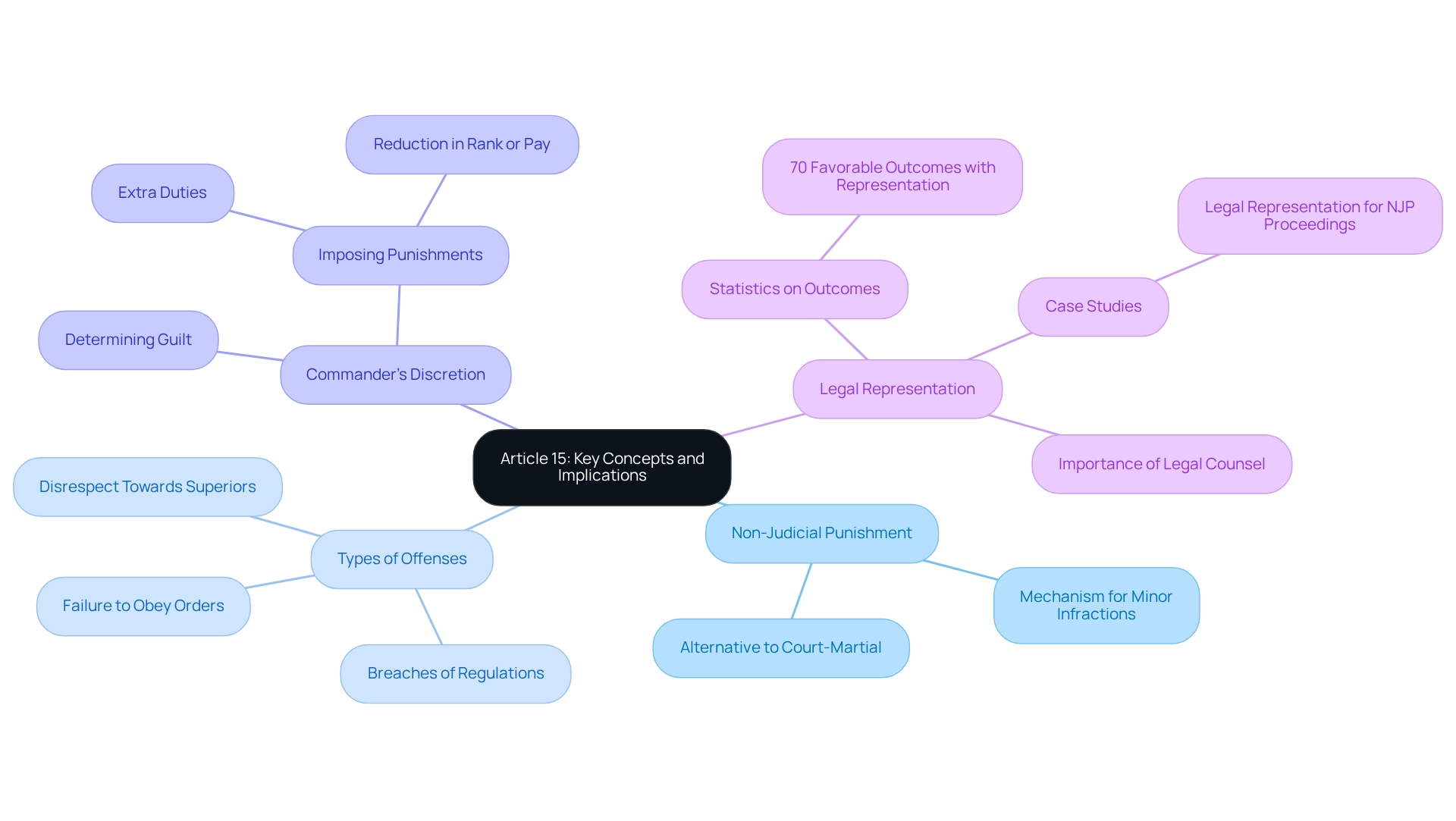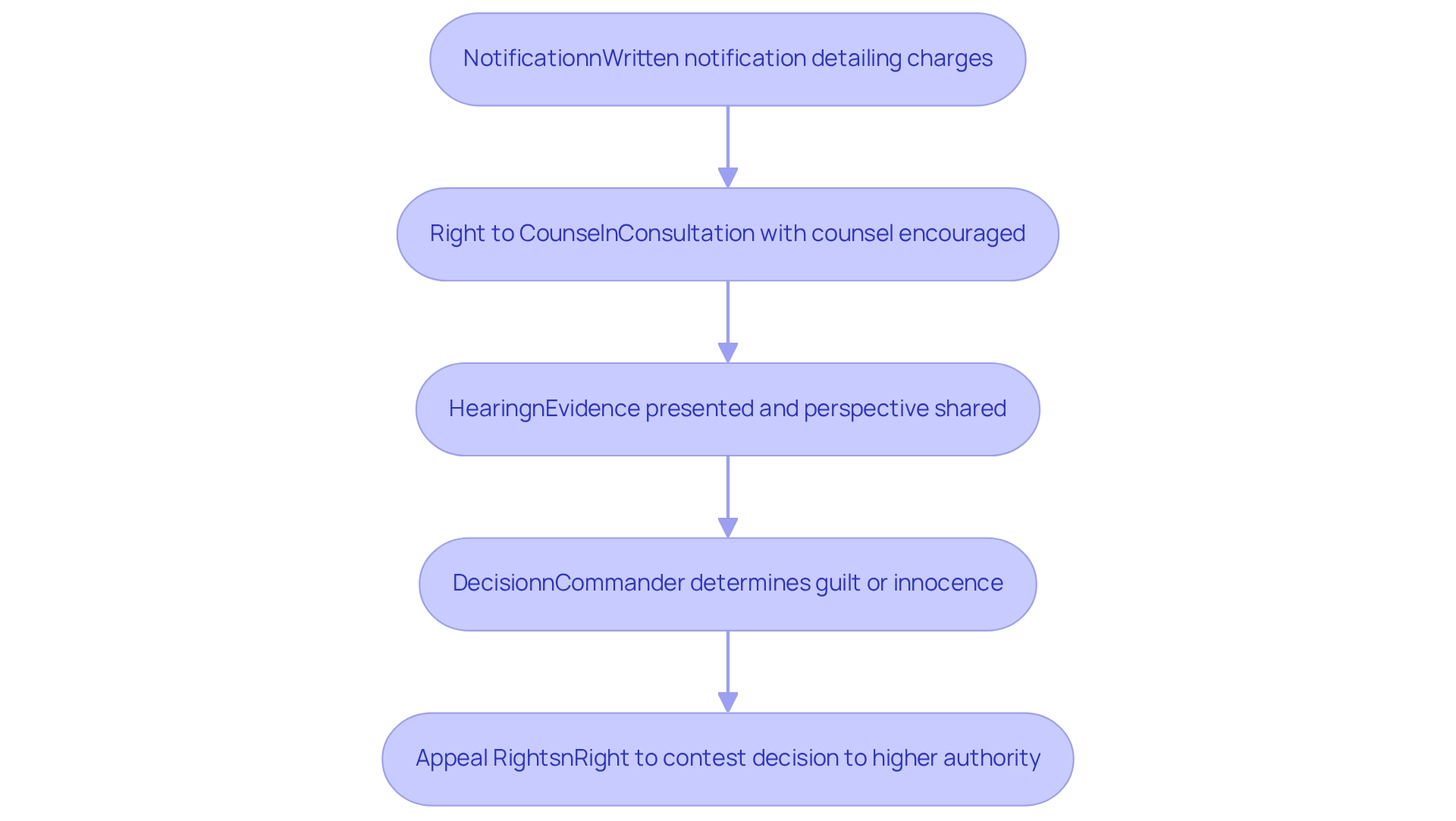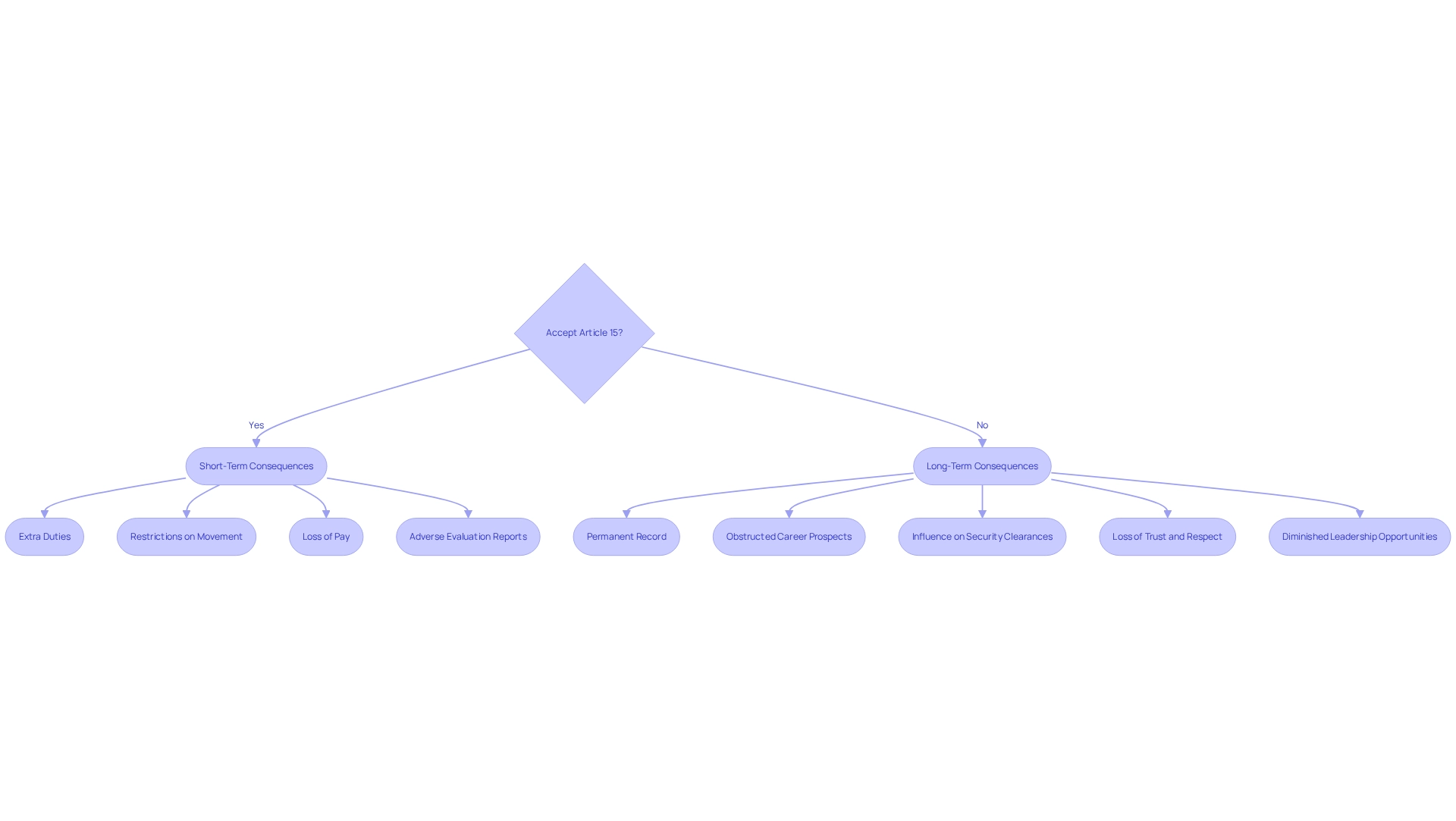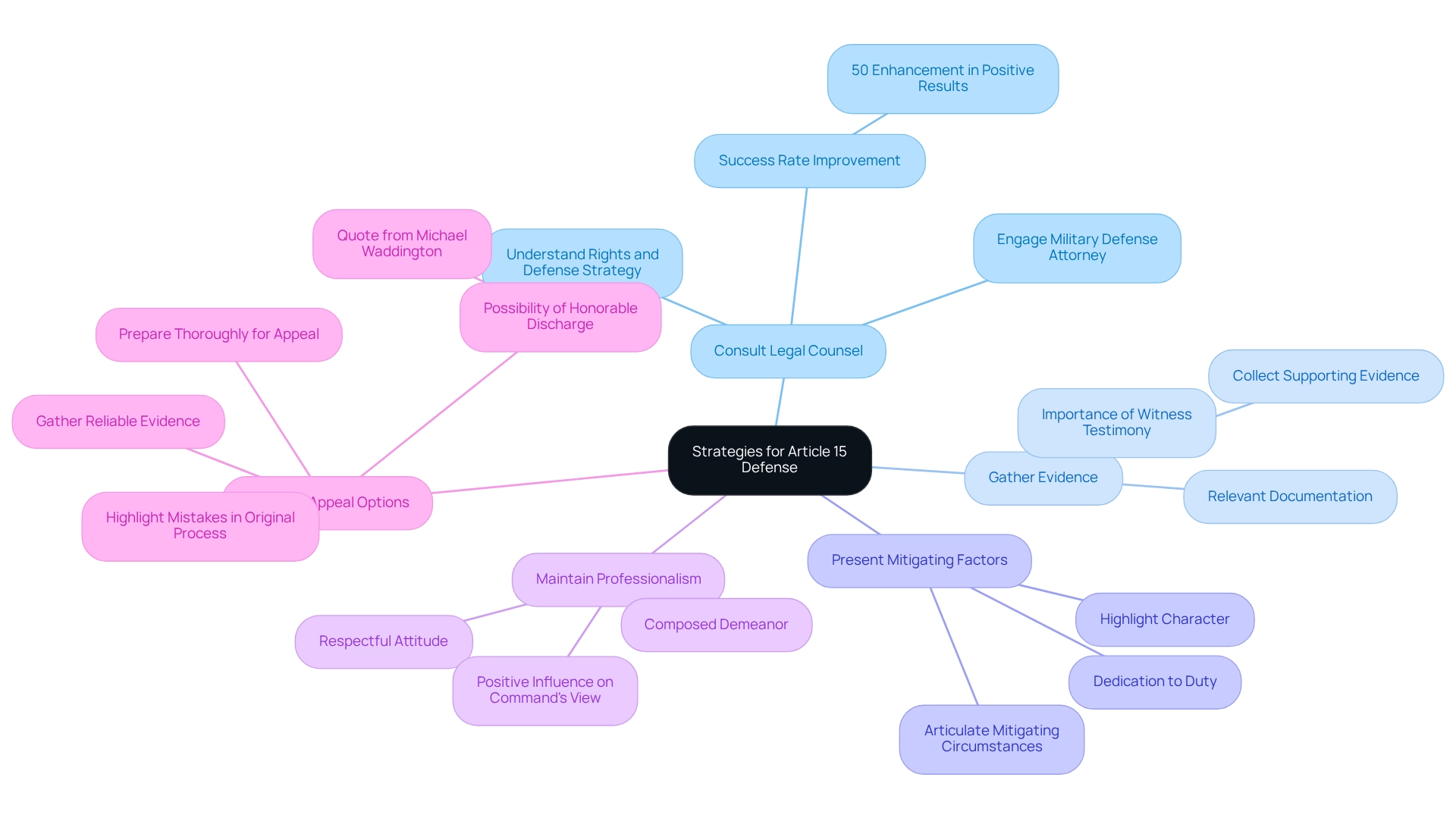Article 15 Explained: Rights, Consequences, and Defense Strategies
Overview of Article 15s
Article 15 of the Uniform Code of Military Justice empowers commanders to administer non-judicial punishment for minor infractions, serving as a crucial mechanism for discipline without resorting to court-martial. Understanding the rights and consequences linked to Article 15 is paramount; effective legal representation can significantly enhance outcomes in these proceedings. Many personnel may face long-term career impacts when they accept such punishments, underscoring the necessity for informed decision-making. Therefore, it is imperative for service members to seek legal counsel to navigate these complex situations effectively.
Introduction
In the intricate realm of military law, Article 15 of the Uniform Code of Military Justice (UCMJ) serves as a crucial mechanism for upholding discipline among service members. This provision empowers commanders to impose non-judicial punishments for minor offenses, creating a pathway to address misconduct without resorting to court-martial proceedings.
The implications of Article 15 extend far beyond immediate disciplinary actions; they significantly influence career trajectories and reputations within the military. To navigate the complexities of this process—encompassing the rights of service members, the potential consequences of accepting an Article 15, and effective defense strategies—understanding is paramount.
As the stakes are high, the role of legal counsel becomes essential, ensuring that service members are adequately equipped to advocate for themselves and protect their futures.
Define Article 15: Key Concepts and Implications
Section 15 of the Uniform Code of Military Justice (UCMJ) empowers commanders to administer non-judicial punishment (NJP) for minor violations, thereby facilitating disciplinary actions without necessitating a court-martial. This system is vital for maintaining discipline and order within the armed forces. Key concepts include:
- Non-Judicial Punishment: Article 15 offers a mechanism for addressing minor infractions without leading to a criminal record, serving as a less severe alternative to court-martial proceedings.
- Types of Offenses: Common violations addressed under Section 15 encompass minor misconduct such as failure to obey orders, disrespect towards superiors, and other breaches of regulations.
- Commander’s Discretion: Commanding officers hold the authority to determine guilt and impose appropriate punishment, which may range from extra duties to reductions in rank or pay.
Recent statistics indicate that approximately 70% of personnel represented by civilian attorneys in Board of Inquiry (BOI) cases achieve more favorable outcomes than those without legal representation. This highlights the significant role of Article 15 explained within the armed forces justice system. As of 2025, amendments to Section 15 have further clarified the procedures and implications of NJP, with Article 15 explained to ensure that service members are informed of their rights and options when confronted with such disciplinary actions.
Real-world examples illustrate the potential consequences of repeated Article 15 offenses, which can lead to discharge or punitive dismissal from service. Engaging experienced defense attorneys, such as those at Gonzalez & Waddington, can markedly enhance the likelihood of a favorable outcome in NJP hearings. Their expertise is crucial in navigating the complexities of defense law and ensuring that personnel receive adequate representation. As one former client remarked, “Hiring Michael and Alexandra was the best decision of my life… They helped me to think clearly and focus on the goal of winning my case.” This underscores the critical importance of legal representation in military proceedings, particularly in NJP cases, where the stakes can be substantial. Understanding these components is essential for personnel to effectively manage the potential repercussions of disciplinary actions, ensuring they are prepared to address any claims that may arise.

Navigate the Article 15 Process: Rights and Procedures
The Section 15 process represents a systematic procedure that outlines essential steps and rights for personnel facing non-judicial punishment. Comprehending these components is crucial for effective self-advocacy.
- Notification: Service members receive a written notification detailing the charges against them, specifying the alleged misconduct. This document is vital for preparing a robust defense.
- Right to Counsel: Although Marine Corps, Navy, and Coast Guard personnel do not possess an explicit right to consult with counsel prior to an Article 15 hearing, most commands encourage such consultation when operationally feasible. Engaging a military defense attorney is advisable to protect one’s military career and navigate the complexities inherent in the process.
- Hearing: The commander conducts a hearing wherein evidence is presented. Service personnel are afforded the opportunity to share their perspective, including witnesses and extenuating circumstances, which can significantly impact the outcome.
- Decision: Following an evaluation of the evidence, the commander determines guilt or innocence and imposes punishment if found guilty. It is important to recognize that a negative assessment from an Article 15 can influence eligibility for VA benefits post-separation.
- Appeal Rights: Should military personnel disagree with the decision, they possess the right to contest it to a higher authority within a specified timeframe, ensuring a check on the commander’s determination. Statistics indicate that a substantial segment of military personnel seeks legal advice prior to hearings of this nature, underscoring the value of legal support in these circumstances. Case studies reveal that understanding the Article 15 procedure and entitlements can yield more favorable outcomes, as personnel who are well-informed are better equipped to navigate the intricacies of armed forces justice. By understanding the Article 15 explained rights and procedures, individuals can make informed decisions and effectively advocate for themselves during the process. If you or a loved one are confronting legal issues in the military, contact Gonzalez & Waddington, Civilian Military Defense Lawyers, at 1-800-921-8607 for a free consultation.

How to Respond: Step-by-Step
How to Respond: Step-by-Step
- Read the Notification: Carefully review the Article 15 notification and charges against you.
- Contact a Lawyer Immediately: Consult an experienced military defense attorney before responding or making statements.
- Gather Evidence: Collect witness statements, texts, documents, or any proof to support your defense.
- Consult on Accepting or Refusing: Discuss with your attorney whether to accept Article 15 or demand a court-martial.
- Prepare Your Defense: Organize witnesses, mitigating evidence, and any explanation of extenuating circumstances.
- Attend the Hearing: Present your side, remain professional, and allow your attorney to address legal and procedural issues.
- Appeal if Needed: If punished, you may be able to appeal to a higher authority—ask your attorney about deadlines and process.
Assess Consequences: Impacts of Accepting Article 15
- Short-Term Consequences: Immediate discipline may include extra duty, restriction, or pay loss. These can affect evaluation reports and reduce your chance of promotion. Evaluation reports are critical to your career.
- Long-Term Consequences: A record of discipline may remain in your personnel file for years or permanently. This can affect security clearances, career advancement, special assignments, and post-service benefits. Up to 50% of administrative separations are successfully contested with legal help.
- Reputation & Trust: Even a single Article 15 can harm your reputation and trust within your unit, impacting leadership opportunities and morale.
- Separation Risk: Multiple or serious Article 15s may result in administrative separation or discharge.

Key Stat: About 70% of personnel represented by civilian attorneys in Board of Inquiry (BOI) or NJP/Article 15 proceedings have better outcomes than those who proceed alone.
Respond Effectively: Strategies for Article 15 Defense
- Retain Counsel Early: Immediate legal advice can help you avoid costly mistakes.
- Document Everything: Keep copies of notifications, correspondence, and evidence. Save digital communications that may help your case.
- Identify and Prepare Credible Witnesses: Your defense is strongest when witnesses are reliable and unimpeachable.
- Mitigate and Explain: If there are extenuating circumstances or a pattern of good service, present this clearly at the hearing.
- Stay Professional: Your demeanor matters. Be respectful and composed in all interactions with command and during hearings.
- File Timely Appeals: If the Article 15 is imposed, act fast—deadlines to appeal are short, and many cases are improved or reversed at the appeal stage.

Case Example
Real Case Example: SGT M., U.S. Army, received an Article 15 for alleged disrespect to a superior. With Gonzalez & Waddington as counsel, M. collected favorable witness statements and provided records of outstanding service. Result: The commander’s findings were overturned on appeal, restoring SGT M.’s eligibility for future promotion. (Results vary—consult your lawyer about your specific facts.)
Frequently Asked Questions (2025)
Q: What is Article 15 in the Army?
A: Article 15 allows commanders to issue non-judicial punishment for minor violations of the UCMJ, like disrespect, unauthorized absence, or minor misconduct, without a court-martial.
Q: Can I refuse Article 15?
A: Usually yes. Most service members may demand a court-martial instead, but that decision should only be made after consulting an attorney, as court-martial carries risks.
Q: Does Article 15 go on my permanent record?
A: Yes, in many cases. It can remain for years, or sometimes permanently, depending on service branch and rank.
Q: Will Article 15 ruin my career?
A: Not always, but it can affect promotion, leadership positions, security clearances, and future assignments. Expert legal counsel can help minimize these effects.
Q: How long does Article 15 stay on my record?
A: This varies by branch. Some records are removed after two years, while others can be permanent. Always ask your lawyer about branch-specific policies.
Q: Should I hire a lawyer for Article 15?
A: Absolutely. Statistics show you’re far more likely to achieve a favorable outcome with experienced military counsel.
Q: What’s new in Article 15 for 2025?
A: Amendments in 2025 clarify notification and appeal rights, and standardize some procedures across service branches. Ask your lawyer for details relevant to your case.



